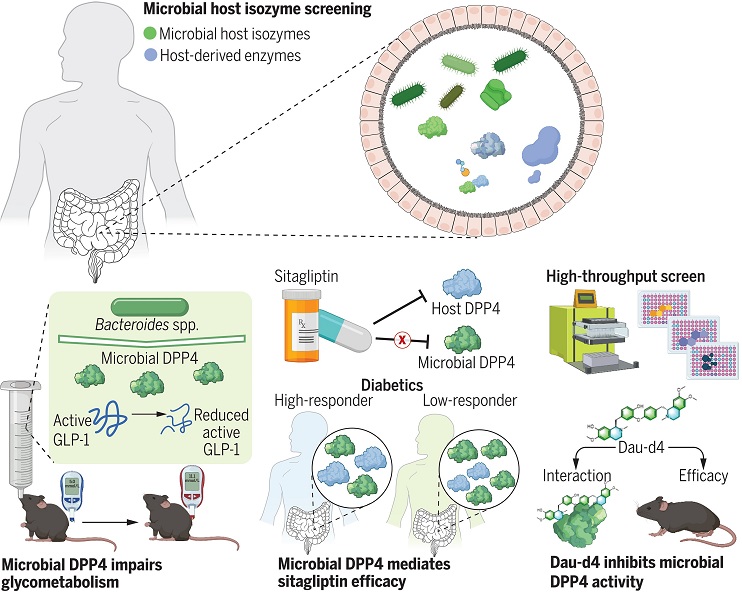Herbs-Phytochemicals: Unlocking the Potential of Traditional Chinese Medicine - Daurisoline Enhances Diabetes Treatment by Inhibiting Microbial DPP4
Thailand Medical News Team Aug 17, 2023 2 years, 5 months, 1 week, 4 days, 23 hours, 24 minutes ago
Herbs-Phytochemicals: In the realm of medical research, the quest for innovative solutions often leads scientists down unexpected paths, sometimes revealing a synergistic relationship between ancient wisdom and modern knowledge. Recent research conducted by a team from Peking University, China, has uncovered a remarkable interplay between traditional Chinese medicinal compounds and cutting-edge pharmaceuticals in the realm of diabetes treatment. This groundbreaking study sheds light on the potential of a phytochemical compound known as daurisoline, derived from the traditional Chinese herb Menispermum dauricum, to enhance the efficacy of established diabetes drugs such as sitagliptin.
 Discovery and inhibition of a gut microbial–host isozyme to regulate host metabolism.
Discovery and inhibition of a gut microbial–host isozyme to regulate host metabolism.
Differences in the gut microbiota may explain why some individuals respond to antidiabetic DPP4 inhibitors but others do not. An activity-based enzyme activity screening system identified gut microbial DPP4 isozymes that can decrease active GLP-1 but cannot be inhibited by sitagliptin. High-throughput screening identified Dau-d4 as a selective inhibitor of microbial DPP4 to increase GLP-1 activity and improve glucose tolerance.
This discovery not only underscores the importance of traditional medicine in the context of modern healthcare but also highlights the intricate interconnections between microbial enzymes and human physiology.
The intricate web of microbial communities residing within the human gut has long captured the interest of researchers exploring its influence on overall health and disease. Microbes dwelling in the gut have been found to produce enzymes analogous to those generated by the human body, with the ability to regulate various physiological processes. These microbial isozymes, though structurally distinct, can significantly impact human health by either augmenting or obstructing the actions of native enzymes. Pioneering the pursuit of these interactions, the study team embarked on a mission to unravel the complex relationship between microbial isoenzymes and metabolic disorders, particularly type 2 diabetes.
Their efforts culminated in the paper titled "Microbial-host-isozyme analyses reveal microbial DPP4 as a potential antidiabetic target," published in the esteemed journal Science.
The study delves into the intricate dance between microbial isoenzymes and human physiology, with a focus on the enzyme dipeptidyl peptidase 4 (DPP4). DPP4, present in both microbial and human forms, plays a crucial role in the regulation of glucagon-like peptide-1 (GLP-1), a hormone responsible for blood glucose reduction and insulin release after meals. Dysregulation of GLP-1 is intricately linked to type 2 diabetes, making it a prime target for therapeutic intervention.
The
Herbs-Phytochemicals study team discovered that certain gut bacteria, specifically species of Bacteroides, produce microbial DPP4 (mDPP4) with the capacity to degrade active GLP-1. Intriguingly, the study team identified an area of concern: the widely used diabetes drug
sitagliptin, designed to inhibit DPP4, failed to effectively inhibit mDPP4. This inefficacy could potentially compromise the treatment outcomes of diabetic patients, raising questions about the influence of gut microbiota on drug efficacy.
Further investigations led the study team to a compelling revelation: the compound daurisoline, derived from traditional Chinese medicine, exhibited the remarkable ability to selectively inhibit mDPP4 without affecting human DPP4.
This finding paves the way for a promising therapeutic avenue.
Dau-d4, a derivative of daurisoline, emerged as a potential game-changer, demonstrating the ability to increase active GLP-1 levels and enhance glucose metabolism in diabetic mice. The real excitement, however, lies in the synergy observed when Dau-d4 is co-administered with sitagliptin. The combination of these two agents resulted in improved blood glucose homeostasis, showcasing the potential for traditional medicine to complement and enhance modern pharmaceutical approaches.
The intersection of traditional Chinese medicine with Western pharmaceuticals raises intriguing questions about the fusion of cultural, scientific, and governmental goals.
China's commitment to modernize traditional medicine, as exemplified by the State Council's strategic plan, embodies a multifaceted approach. The goal of integrating traditional Chinese medicine with Western practices underscores the importance of unlocking the untapped potential of ancient remedies through rigorous scientific inquiry.
However, the convergence of these objectives also introduces considerations related to research bias and scientific exploration. While enhanced funding and support for research can drive innovation, aligning research parameters with predefined goals might inadvertently limit the scope of inquiry. A balance must be struck to ensure that scientific exploration remains open, unbiased, and receptive to unexpected discoveries.
The implications of this study extend beyond the confines of laboratory experimentation. The findings of this research carry profound implications for diabetes treatment and, more broadly, the advancement of personalized medicine. By elucidating the intricate interplay between microbial enzymes, traditional Chinese medicine, and established pharmaceuticals, this study encourages interdisciplinary collaboration and exploration, bridging the gap between Eastern and Western approaches to healthcare.
In conclusion, the groundbreaking research conducted by the team at Peking University showcases the potential of traditional Chinese medicine in modern healthcare. The identification of daurisoline as a selective inhibitor of microbial DPP4 highlights the remarkable synergy that can arise from combining ancient remedies with contemporary pharmacology. This study serves as a testament to the power of scientific exploration, cultural preservation, and governmental support in fostering innovation that transcends boundaries.
The study findings can be found here:
https://www.science.org/doi/10.1126/science.add5787
For the latest on
Herbs-Phytochemicals, keep on logging to Thailand Medical News.
